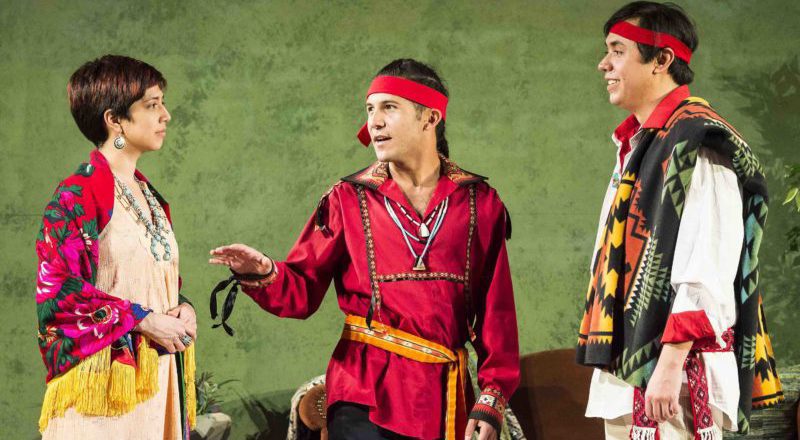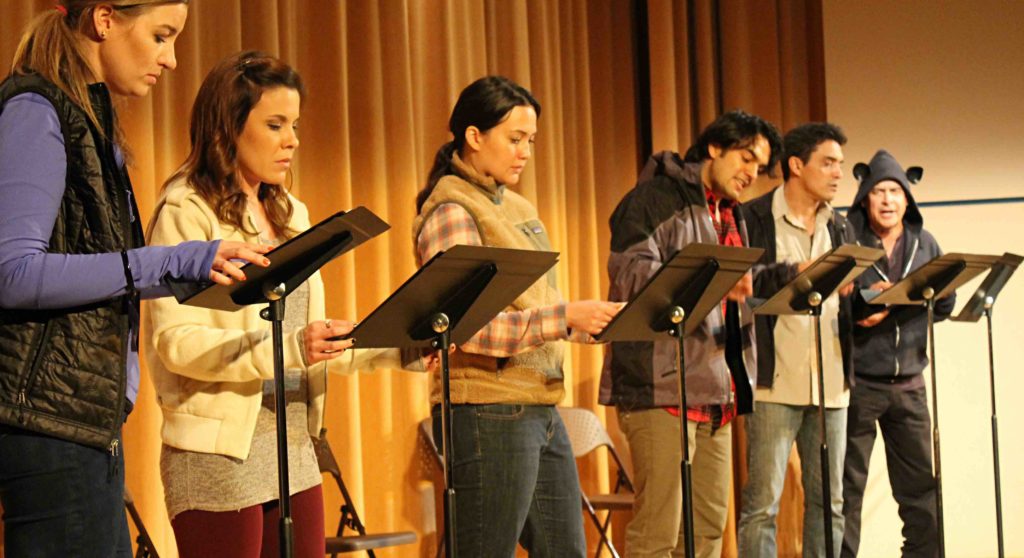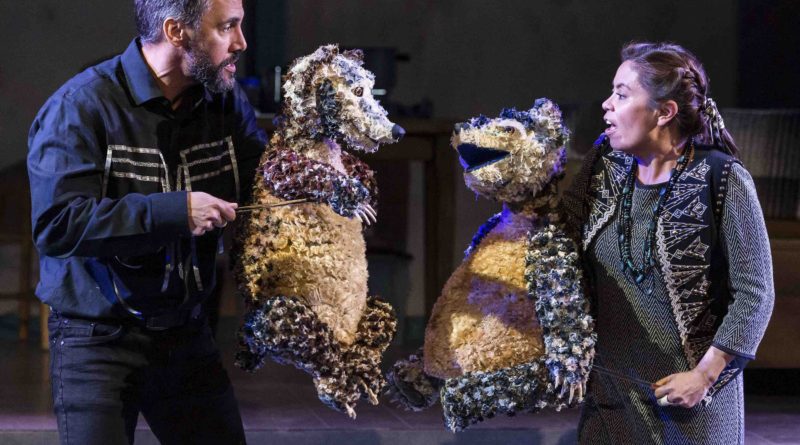INTERVIEW: Randy Reinholz looks back at his many years of developing Native Voices
Photo: From left, Robert Vestal (Cherokee descent) plays Badger 1 and Rainy Fields (Muskogee [Creek]/Cherokee) plays Badger 2 in Lying With Badgers. Photo courtesy of © 2020 Craig Schwartz Photography / Provided by Native Voices with permission.
One of the most profound cultural institutions in the United States over the past 25 years has been Native Voices, a theater company housed at the Autry Museum of the American West in Los Angeles. Co-founded by producing artistic director Randy Reinholz and producing executive director Jean Bruce Scott, Native Voices has given numerous opportunities to Native actors, writers and artists for more than two decades, and now Reinholz is stepping down from his position to welcome in new change.
Replacing Reinholz (Choctaw Nation of Oklahoma) at the top of the company is DeLanna Studi (Cherokee), an accomplished actor and writer.
The company has not only been led by Reinholz and Scott over the past quarter of a century, but it has also served as an outlet for Reinholz’s own work to be produced. For example, a few years ago they staged Off the Rails, a reimagining of Shakespeare’s Measure for Measure set in the old West, and the company is still developing his Montana-set Under the Big Sky. Audience members even had the chance to catch Reinholz on the stage, like when he acted in The Bird House by Diane Glancy.
Through their tenure, Native Voices has produced 38 full-length plays, 26 New Play Festivals and 9 Short Play Festivals; toured nationally and internationally; and held approximately 300 workshops and readings with artists from more than 100 distinct Native nations from across North America, according to press notes.
There have been many memories for Reinholz over the last 26 years, but he knew that a plan needed to be put in place for the one day when he decided to step down and let someone else become artistic director. That time has come, and both Reinholz and Scott will enter into emeritus roles.
“What we’ve been talking about for the last few years at Native Voices is succession,” Reinholz said earlier this year, before the coronavirus pandemic changed everything for regional theater. “My partner and wife, Jean Bruce Scott, and I founded Native Voices approximately 26 years ago. We didn’t set out to found a theater company. We were trying to get a theater initiative up so that we could bring more attention to the great Native writers we were reading. That eventually became a theater company — Native Voices — and at about the 15-year mark, it becomes pretty important for founders to start thinking about: is this their own personal company, or is this something bigger than themselves.”

That question circulated in Reinholz’s mind almost a decade ago, and then six or seven years ago they started to develop some concrete plans. They wanted Native Voices to keep going, but at the time they were struggling to convince regional theaters around the country to produce Native playwrights’ work.
“We still were having trouble getting productions, and we thought this was so important — the possibility for Native people to produce at union-level talent,” he said. “So we started thinking about how we might work a succession plan, and as we started to talk about that, it became clear that finally the major theater companies were going to start producing. So we’ve had shows at Oregon Shakespeare Festival, and there’s one at Yale Rep now. So sort of the standard bearers of regional theater are producing Native theater, and at some point, people in New York will get on board, too.”
This uptick in outside productions led Reinholz and Scott to try to “professionalize” Native Voices as much as possible. They considered what the new structure should be, and they settled on a plan of bringing on a co-artistic director for a number of months. This person would work alongside Reinholz, and then if everything worked out, he would step away. They found that successful candidate in Studi.
“The Autry also wanted Native Voices to stay at the Autry in a more permanent way,” Reinholz said. “So they started putting a lot of the executive director duties — fundraising duties, organizing, thinking — on staff at the Autry, and they were able to parse out what pieces Jeannie had done that way. But we did need an artistic leader to come in and take over my position. So we thought [we needed] someone to work with me for a period of time, and then hopefully things will go well. And that person then becomes the artistic director, and I think what everyone was surprised was the depth of talent.”
Approximately 60 applications came in for the leadership position, and Studi was chosen. The co-artistic director period has now come to a close, and Reinholz will officially be stepping down.
“I’m a practicing artist,” said Reinholz, who is also a college professor at San Diego State University. “We really want a practicing theater artist, and DeLanna is well-positioned for that. Her one-woman show had a great run.”
Studi’s theater credits include the first national Broadway tour of August: Osage County, off-Broadway’s Gloria: A Life and Informed Consent at The Duke on 42nd Street. Her one-woman show is And So We Walked: An Artist’s Journey Along the Trail of Tears, which retraces her family’s footsteps along the Trail of Tears with her father.

Over the years, Reinholz has seen positive change for Native artists. For instance, he said that the submissions for the company’s full stage productions and reading series have grown more diverse with their content.
“They don’t have to pick one or two issues,” he said. “There’s a young woman who is 18 years old in a performing arts school here in Southern California who has written a play. … And it’s about murdered and missing women, and she uses a tapestry of old stories to tell this very contemporary problem through a young girl’s point of view. And having an 18-year-old write, that’s quite important and profound.”
It’s not hard to imagine that Reinholz will be connected to Native Voices forever. Whether through his writing or acting or his dedicated attendance in the audience, the artistic director has clearly left his mark on the company, and Native artists are grateful.
“Native Voices is a family, and everybody who participates understands what that means,” he said. “There’s an obligation, but there’s also a special place and a safety, everything from not having to explain one’s culture to being with other people who more or less get the basic premises of life in Indian country.”
By John Soltes / Publisher / John@HollywoodSoapbox.com
Click here for more information on Native Voices at the Autry.

